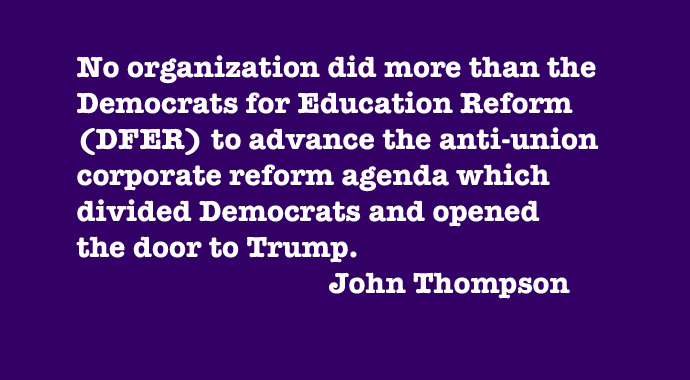By John Thompson.
Rachel M. Cohen’s “The War on Public Schools” warns that “Charters, vouchers, and disposable teachers are Trump’s targets.” Cohen’s American Prospect article details both the president-elect’s agenda, and a political history that Democrats shouldn’t ignore.
Trump has long proclaimed his plan to invest $20 billion dollars for expanding charters and private-school vouchers. Charter supporter Martin West suggests that Trump is likely to triple the annual federal investments in charters. Moreover, Republicans are “eager to expand Washington, D.C.’s private-school voucher program.” The Heritage Foundation’s Lindsey Burke says, “I think [the Republican Congress and new administration] could eventually turn D.C. into an all-choice district like we see in New Orleans.”
One would have thought that regardless of one’s position on choice that one lesson of post-NCLB school policy is that there are many mediocre, average, and bad charters but there aren’t nearly as many high-performing, high-poverty charters as would be necessary to significantly improve urban and rural education. But, Betsy DeVos’ husband, Richard, was an investor in K12 Inc., a national for-profit virtual charter school company. If voucher funding is expanded, true believers in competition could delude themselves into believing – or claiming to believe – that for-profit online learning will create scalable solutions.
Before Rob Goad was named as the White House education advisor, Cohen described his Title I portability agenda. She reviewed the defeat of portability after President Obama threatened to veto “any version of the law that contained it,” and she wrote, “a White House report issued in 2015 said that Title I portability would direct significant amounts of federal aid away from high-poverty districts toward low-poverty ones.”
Trump will probably fill the vacant US Supreme Court seat with a nominee who would advance the corporate reform agenda. Most frightening are “alike cases headed to the Supreme Court,” and “a near certainty that a reconstituted majority of five conservative justices will strike down agency fees, which could considerably reduce the resources available to the American Federation of Teachers and the National Education Association.”
As Cohen explains, progressives and school reformers must not forget the history which paved the way for Trump’s education agenda. She writes:
George W. Bush and Barack Obama administrations softened the ground for a federally incentivized expansion of vouchers and other forms of privatization. In the bipartisan deal that led to the enactment of No Child Left Behind in 2002, Bush and Democrats led by Senator Edward Kennedy traded federal standards for more federal funding. The subtext was the Republican narrative that public schools were failing. This in turn led to the era of standardized testing and punitive measures against “failing” schools.
Cohen also notes the equivocations of neoliberal school reformers about whether they should collaborate with Trumpism. No organization did more than the Democrats for Education Reform (DFER) to advance the anti-union corporate reform agenda which divided Democrats and opened the door to Trump. DFER’s Shamar Jeffries initially urged Democrats “to refuse to accept an appointment to be Trump’s secretary of education” and thus “become an agent for an agenda that both contradicts progressive values and threatens grave harm to our nation’s most vulnerable kids.’”
But, DFER:
Soon walked back their original declaration of opposition to Trump. In a statement sent to the group’s supporters, Jeffries wrote that DFER was not saying Democrats should not work with Trump on education, but just that no Democrat should work for him as secretary of education. “[W]e draw a distinction between working with and working for Trump,” Jeffries wrote. “Where appropriate, we will work with the Administration to pursue policies that expand opportunity for kids, and we will vocally oppose rhetoric or policies that undermine those opportunities.”
According to that logic, had Father Coughlin, David Duke, or George Wallace been elected president, civil rights activists should have worked “with” but not “for” their agendas.
What do you think? Why won’t the Democrats for Education Reform take a principled stand? How much did it and neoliberal reformers contribute to the Trump victory? Will we defeat DeVos? Will we defeat Trump? I only know that we won’t give in to Trumpism.





Leave a Reply